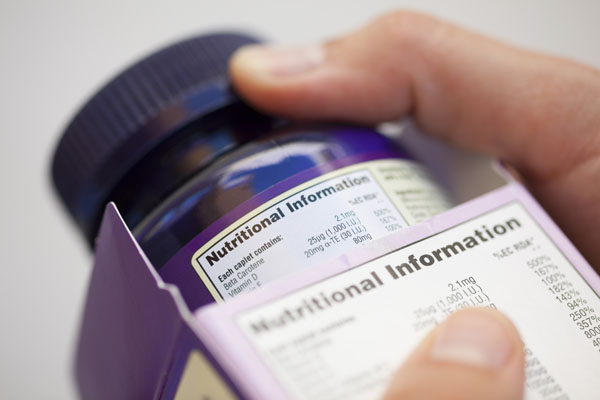Fuelled by shifting attitudes towards an on-the-go lifestyle and the rising bank of scientific studies that prove the benefits of food supplements, manufacturers are turning to innovative ingredients and dosage form solutions to meet consumer needs.
Faced with an overwhelming choice of food supplements, gaining insights into consumer behaviour is becoming increasingly essential for manufacturers to ensure their supplements stand out on the shelves.
Aiming to better understand consumers, a recent survey commissioned by Capsugel and conducted by the Natural Marketing Institute (NMI) looked at the key drivers and concerns for 3000 supplement users across France, Germany and Italy. The results highlighted the differences between the age groups and regions; but, despite these nuances, safety and quality were the top two overriding concerns for consumers surveyed.
Purchasing power: what consumers want
The European supplements market is showing no signs of slowing down – it is predicted to reach an estimated €7.9 billion market value by 2020.
As consumers are becoming more aware of the health benefits of food supplements, they are also increasingly discerning. As such, the bar is set high for supplements; NMI data shows that consumers (86%) base their purchasing decision on quality.
Supplements is one area wherein facts are just as important as brand messaging for consumers. The survey found that fact-based decision making is a reoccurring theme – consumers are now seeing past the generic health and wellness messaging to demand evidence that the supplements are effective.
For example, 86% of respondents state that proof that ingredients work is one of their top priorities when buying food supplements.
Although supplements are increasing in popularity across all age groups, the category still attracts the most attention from the older generations, such as the baby boomers born between the mid-1940s and mid-1960s. With healthy ageing and bone and joint health key concerns for this age group, interest remains high in supplements that can be used to manage specific health conditions, such as vitamin D, vitamin K2 and krill oil.
For manufacturers, understanding the preferences of the intended audience can help in developing more targeted products. Taking boomers as an example, the NMI data indicates that vegetarian supplements are more important for them when compared with millennials who were born between the 1980s and 2000s.
Proving provenance
However, the data show that safety remains a significant concern among boomers taking supplements. With recent product recalls and high-profile allergy scares, shoppers are more worried about what they are consuming, which has led to an increased focus on traceability and provenance.

As more consumers look for trustworthy labels on their products, manufacturers need make sure that they can have confidence in their supply chain. To take an example from the NMI data, 81% of respondents rank knowing the source of ingredients as a major cause for concern. Again, baby boomers are leading this trend as the generation that is most concerned with both safety and supply chain integrity.
Natural ingredients
With supplement users looking for products they can trust, consumers continue to look for specific label claims in line with the ongoing clean label trend. For example, 57% of respondents interested in the sports nutrition category prefer to buy dietary supplements that are derived from natural sources, while in the digestive health category, 61% of supplement users cite "natural" as a strong factor in their purchase.
Consumers surveyed also consider no preservatives (71%) and non-GMO (65%) to be important features when purchasing supplements. To pacify these concerns, clear and understandable information is crucial. Shoppers are increasingly looking to product packaging for details on origin and sourcing of ingredients, so it is integral that this can be accessed easily from the outset.
Alongside ingredient selection, the choice of delivery system is an important consideration in achieving a clean label supplement product. Capsugel offers the broadest range of vegetarian capsules on the market, including hypromellose (HPMC) based Vcaps, Vcaps Plus, DRcaps, and pullulan-based Plantcaps capsules.
As well as supporting both liquid and solid ingredients and complex formulations, Capsugel’s plant-based portfolio supports supplement manufacturers in facilitating label claims in line with the latest consumer preferences. For instance, its Vcaps Plus capsules are approved for use with organic ingredients, enabling finished products to be labelled as organic.
A parallel trend for safety is vegetarian and vegan supplements, thanks to the rise in popularity of plant-based diets. For example, an estimated 10% of the German population is vegetarian, with veganism becoming increasingly popular.
This widespread shift in consumer attitudes is also affecting consumer buying behaviour in the food supplements industry. According to the NMI data, 46% of those surveyed didn’t want their supplements to contain animal products – and this is more prevalent among boomers.
Awareness is high among this age group; the survey indicates that 77% of boomers are aware that supplements can be vegetarian-based. Similarly, consumers are more likely to pay more for organic ingredients or plant-based ingredients in supplements – particularly in France and Italy, where it is considered to be a premium purchase.
Delivery benefits
Supplement manufacturers are experimenting with new delivery forms to make sure that changing consumer demands are met, while also satisfying safety and performance requirements. For example, taste and smell rank highly for respondents, with 66% citing both features as important.
Consequently, increasing numbers of manufacturers are innovating with different delivery systems. To serve a growing need for new and innovative offerings, Capsugel has developed an array of liquid, lipid and multiparticulate formulation and encapsulation solutions to enhance bioavailability and develop different release profiles for effective delivery.
In addition to beadlets and liquid formulations, Capsugel has developed Lipid-Multiparticulate (LMP) technology to improve the performance of nutritional actives, enabling bioavailability enhancement, modified release and taste and odour masking.
Finding ways to combine previously incompatible ingredients, to maximise health benefits and meet consumers’ demands, has also been an area of innovation. For example, DUOCAP is a two-in-one capsule for a combination of incompatible ingredients, in liquid and solid formulations.

Designed to overcome complex formulation challenges, DUOCAP has been used to deliver new product concepts such as a unique bone and cardiovascular health dietary supplement that combines vitamin K2, omega-3 and magnesium. The DUOCAP technology keeps sensitive ingredients separate to prevent blending, while combining them into a single daily intake for consumer convenience.
The future
Unquestionable product safety is, without doubt, the biggest concern for supplement users, with 86% of consumers citing it as a worry when surveyed. Linked to this trend, the results show that the demand for traceable products continues to grow.
In this context, Capsugel’s capsules comply with food regulations and are also manufactured in pharma-grade environments that are certified by EXCiPACT, providing a further indicator of its stringent safety and quality standards.
Given concerns on safety and quality in supplements, it should be a fundamental aspect of any product messaging in future developments, helping to provide reassurance and build trust.
However, the survey results show that a blanket approach to supplements will no longer satisfy diverse European preferences. Manufacturers are now providing tailored solutions to meet the varied and evolving consumer needs – across different generations and regions.
The latest dosage form technology provides the flexibility to meet consumer needs, while delivering both safe and high quality food supplements. There are also numerous opportunities for manufacturers to build on their positioning to expand into clean label and vegetarian options, tapping into current consumer preferences across Europe.
